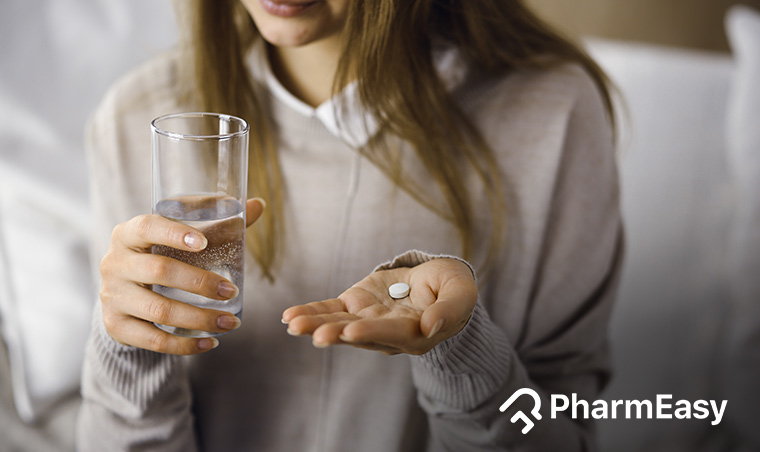What Is The Effect Of Taking The COVID-19 Vaccine And Prescription Drugs Together?
By Shreya Gupta +2 more

Download PharmEasy App




Register to Avail the Offer
Send OTPBy continuing, you agree with our Privacy Policy and Terms and Conditions
By Shreya Gupta +2 more
COVID-19 vaccines have a lot of controversies and questions surrounding them since the general public is still cautious on how to deal with the virus. An important question surrounding it is the interaction between the COVID vaccine and other drugs. Are there medicines that should be avoided when getting a vaccine or not?

Table of Contents
Most studies conducted till now indicate that the COVID vaccine and other drugs don’t interact with each other to harm your health. Thus, any medicine, in particular (unless specified by your physician), does not need to be avoided. However, certain precautions must be taken with respect to certain medications to prevent any adverse side effects.
If you recently underwent an organ transplant surgery and are taking any immunosuppressive drugs, you should consult your physician before taking the vaccine. Ideally, your doctor will advise you to wait for some time after the surgery before getting your vaccine. Immunosuppressive drugs have the possibility of decreasing vaccine efficacy. The vaccine works by triggering a response from the immune system in order to produce antibodies against the COVID-19 virus. Immunosuppressive medications can reduce the effectiveness of the vaccine as they suppress the immune system. If you are taking immunosuppressive drugs you should still go and get vaccinated. The efficacy of the vaccine may be less for immunocompromised patients, however, it does provide protection against the virus. Getting the vaccine ensures more protection than what the body can offer you without vaccination at all.
Steroids also suppress the immune system of the body. If you are on long-term steroids they should be continued along with the COVID-19 vaccine. Your doctor can help you understand and modify the dose if needed. However, if you are planning on taking steroid injections it is recommended to postpone taking them (up to 2 weeks) till after you are done getting vaccinated.
People who are on regular medication for diabetes, blood pressure, hypothyroidism, heart conditions, kidney conditions, etc should not stop their medication if they are about to get vaccinated. However, those with heart conditions and bleeding diseases should first check the kind of anticoagulant they are currently taking before rushing off to get the vaccine. Consulting with your doctor would be ideal in this case.
A prevalent practice that has been observed is the consumption of painkillers and anti-inflammatory medication before getting vaccinated. This is something that should be avoided, as taking anti-inflammatory medication will not provide any additional protection from the symptoms of your immune response. Taking these medicines before getting vaccinated can dull the immune response to the vaccine, which may reduce the vaccine effectiveness. It is ok if you take paracetamol to manage your symptoms after the COVID vaccine but it is not advisable to take any pain killer or other anti-inflammatory medicine before vaccination.
Yes. Patients taking drugs for comorbidities should get vaccinated at the earliest. Patients with comorbidities are at more risk if they contract the virus. People with diabetes or blood pressure can take the vaccine along with their ongoing medications. It is better to consult a physician before getting the vaccine as individual health needs and responses vary greatly.
COVID vaccine and other drugs do not interact negatively in general. It is safe to take the vaccine along with chronic drugs. Be mindful if you take immunosuppressive drugs or treatment for an autoimmune disorder, bleeding or clotting disorder, then ensure to consult a physician before getting vaccinated. Your doctor may advise a dose adjustment of some medicines if needed. By no means should you ever try to change the dosage or skip any of your ongoing medicines without consulting your doctor. Taking the vaccine should not be avoided even if you are taking medication. But certain precautionary measures are recommended such as discussing with your doctor. The vaccine minimises the chances of you contracting COVID-19. Always wear your masks, practice social distancing and adhere to the safety guidelines in your city.
Disclaimer: The information provided here is for educational/awareness purposes only and is not intended to be a substitute for medical treatment by a healthcare professional and should not be relied upon to diagnose or treat any medical condition. The reader should consult a registered medical practitioner to determine the appropriateness of the information and before consuming any medication. PharmEasy does not provide any guarantee or warranty (express or implied) regarding the accuracy, adequacy, completeness, legality, reliability or usefulness of the information; and disclaims any liability arising thereof.
Links and product recommendations in the information provided here are advertisements of third-party products available on the website. PharmEasy does not make any representation on the accuracy or suitability of such products/services. Advertisements do not influence the editorial decisions or content. The information in this blog is subject to change without notice. The authors and administrators reserve the right to modify, add, or remove content without notification. It is your responsibility to review this disclaimer regularly for any changes.
Comments